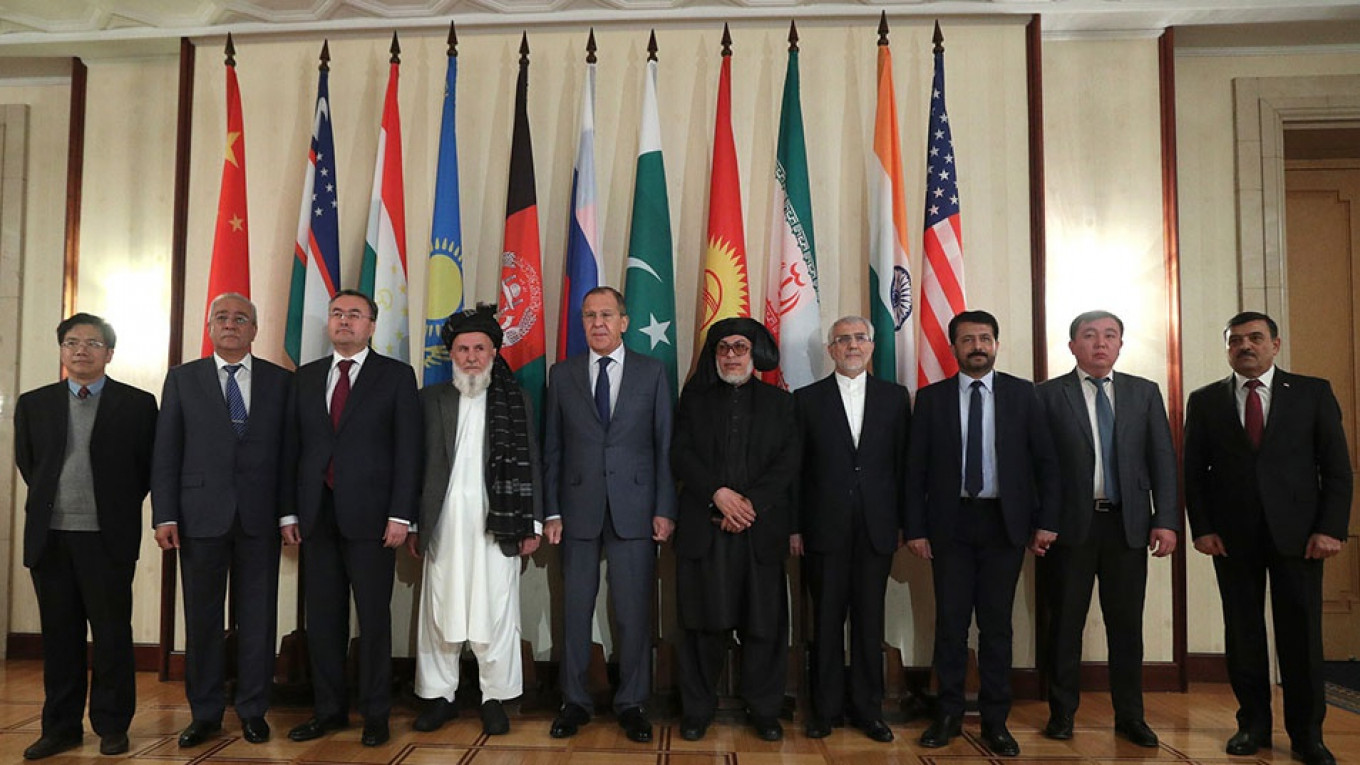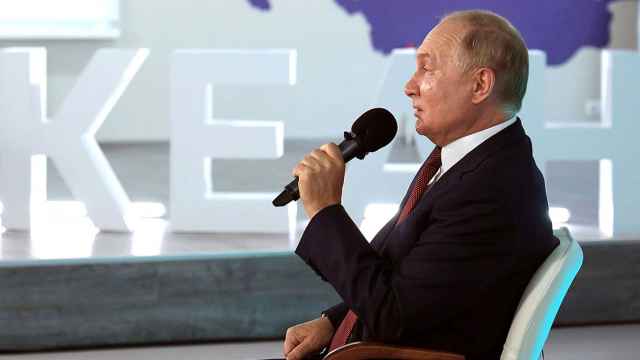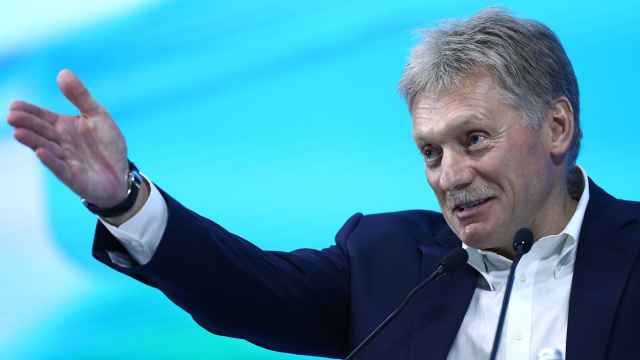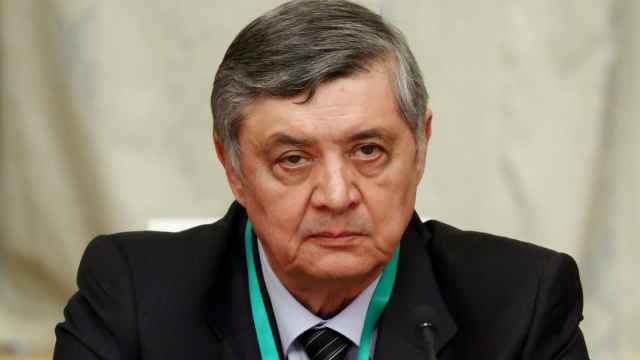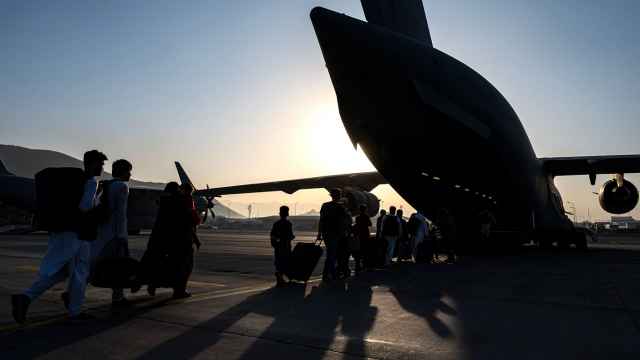Russia is challenging the U.S. by hosting the Taliban at a Moscow peace conference in the latest source of friction between the two former Cold War foes.
Representatives from the Afghan militant group joined the talks on Friday to which Russia’s invited a dozen countries. Afghan President Ashraf Ghani, who pressed Russia to cancel a similar meeting in September, sent four senior members of his nation’s High Peace Council. The two groups were seated around an oval table either side of the Russian chairman.
Russia seeks to promote “inclusive, inter-Afghan dialogue” to try to resolve Afghanistan’s 17-year civil war, Foreign Minister Sergei Lavrov said at the opening of the conference. The presence of both sides “will be an important contribution to providing favorable conditions for the start of direct talks between the government and the Taliban movement,” he said.
While the Moscow meeting isn’t likely to yield concrete results, Russia’s intervention is taking place as President Donald Trump’s administration has stepped up diplomatic activity, twice sending officials to meet with the Taliban in recent months and appointing a veteran envoy to advise on Afghan peace. The Taliban have said they are ready to talk to the U.S. to end the war, but not with the Afghan government they deem illegitimate.
The U.S. sent an observer from its Moscow embassy to the meeting after it refused to attend the September talks, saying they wouldn’t help efforts to end the conflict.
‘Very Important’
It’s “very important to come here,” Azizullah Din Mohammad, the head of the High Peace Council’s delegation, told reporters. “When there is peace there will be no need for Americans in Afghanistan.”
Ghani likely agreed to participate this time “because he recognized the significance of this meeting, even though it won’t result in anything substantive,” said Michael Kugelman, a senior associate for South Asia at the Woodrow Wilson Center in Washington. “Given how keen Kabul is to launch a peace process, amid a strengthening insurgency and intensifying violence, it recognizes that any meeting about a peace process with Taliban participation is worth attending.”
Russia, which backs Taliban demands for a pullout of American forces, invited regional powers including Iran, Pakistan, Tajikistan, Uzbekistan and Turkmenistan to the talks as well as the U.S. Ghani opposed the September meeting in a call to Lavrov, demanding that any peace moves be Afghan-led.
“Russia has managed to steal the agenda from the U.S.,” said Ruslan Mamedov, program director at the Russian International Affairs Council, a research organization set up by the Kremlin. “It’s shown it is willing and capable of promoting national reconciliation in Afghanistan.”
‘Initiate’ Talks
No government, including Russia, can be a substitute for the Afghan authorities in direct negotiations with the Taliban, the U.S. State Department said in an emailed statement.
The Moscow meeting will examine ways to “initiate direct talks between the Afghan government and the Taliban,” a spokesman for the High Peace Council, Sayed Ehsan Tahiri, said by phone. Its representatives won’t meet directly with the Taliban officials, he said.
Senior Taliban members from their political office in Doha attended to discuss the withdrawal of U.S. and NATO forces and Afghan peace, a spokesman, Zabihullah Mujahed, said by phone.
The insurgent group fighting with Afghan forces and their U.S. backers contests or controls half of Afghanistan, more than at any time since the Taliban was toppled in 2001 in an American-led invasion to destroy terrorist training camps run by Osama Bin Laden.
Ghani and the U.S. are struggling to bring the group to the negotiating table. The U.S., which has accused Russia of arming the Taliban, has poured more troops into Afghanistan and waged a series of air strikes as it seeks to regain the military edge.
Russia denies arming the Taliban though it says it’s in dialogue with the movement that ruled the country from 1996 to 2001. It fought a decade-long war in Afghanistan during the Soviet era, losing thousands of troops before a humiliating military withdrawal in 1989.
A Message from The Moscow Times:
Dear readers,
We are facing unprecedented challenges. Russia's Prosecutor General's Office has designated The Moscow Times as an "undesirable" organization, criminalizing our work and putting our staff at risk of prosecution. This follows our earlier unjust labeling as a "foreign agent."
These actions are direct attempts to silence independent journalism in Russia. The authorities claim our work "discredits the decisions of the Russian leadership." We see things differently: we strive to provide accurate, unbiased reporting on Russia.
We, the journalists of The Moscow Times, refuse to be silenced. But to continue our work, we need your help.
Your support, no matter how small, makes a world of difference. If you can, please support us monthly starting from just $2. It's quick to set up, and every contribution makes a significant impact.
By supporting The Moscow Times, you're defending open, independent journalism in the face of repression. Thank you for standing with us.
Remind me later.


